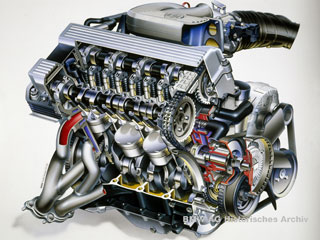BMW 318ti: A Traditional Compact with Classic Allure
Essential Factors To Consider for Picking the very best Engine for Your Requirements
In the realm of choosing the excellent engine to satisfy your requirements, a number of critical factors demand meticulous consideration to guarantee ideal performance and performance. From the nuanced equilibrium between power and efficiency to the often-overlooked facets of maintenance and service needs, each aspect plays a pivotal function in determining the most appropriate engine for your particular needs.
Power and Efficiency
When evaluating engines for optimum efficiency, it is critical to prioritize both power outcome and performance. Power result gauges the capacity of an engine to produce energy, which directly affects its performance. A high power output is important for demanding jobs such as sturdy applications or high-speed needs. It ensures that the engine can handle the workload properly and efficiently. Power alone is not enough; effectiveness plays a substantial role in figuring out the total efficiency of an engine. Effectiveness describes exactly how well the engine converts fuel into functional energy. A much more reliable engine will certainly supply far better gas mileage, reduced discharges, and reduced operating prices. Striking the right balance between power output and efficiency is key to choosing an engine that meets your details demands. When making this decision, it is crucial to consider elements such as the intended usage of the engine, environmental effect, and long-term expense ramifications. By carefully assessing both power and effectiveness, you can pick an engine that supplies ideal performance and fulfills your requirements successfully.
Fuel Efficiency and Economy
Fuel performance refers to the engine's ability to transform gas right into energy with very little waste, directly influencing operating prices and environmental sustainability. Engines with greater gas efficiency not just decrease gas expenses however likewise decrease carbon emissions, contributing to a greener procedure.

Compatibility and Application
Thinking about the fuel efficiency and economy of an engine, the following critical aspect to address is its compatibility and application within certain operational contexts. Compatibility refers to just how well the engine integrates with the total system or tools it powers.
Additionally, the application of the engine is just as vital. Various engines are developed for details purposes, whether it be industrial machinery, marine vessels, cars, or power generators. Understanding the designated application enables the option of an engine that can provide the needed power outcome, torque, and functional qualities. For example, a high-revving engine designed for performance automobiles would certainly not appropriate for heavy-duty building equipment that calls for high torque at reduced speeds.
Maintenance and Service Needs
Upkeep and solution needs play an important function in ensuring the durability and ideal efficiency of an engine. Routine upkeep is vital to avoid break downs, extend the life-span of the engine, and preserve its performance. When picking an engine, it is very important to consider the producer's recommended upkeep routine and the schedule of service facilities or certified specialists.
Elements such as the regularity of oil changes, filter replacements, and general examinations can substantially impact the engine's efficiency. Some engines might need even more regular maintenance based upon their style and use, while others may have longer intervals between maintenance checks. It is vital to comply with these solution needs to avoid expensive repair work and unexpected downtime.
Cost and Budget Plan Factors To Consider
Spending plan restraints often play a substantial function in the decision-making process when picking an engine for a specific application. When considering the cost and budget plan implications of choosing an engine, it is essential to examine not just the preliminary acquisition cost yet likewise the long-term costs associated with upkeep, fuel consumption, and possible upgrades or fixings. It is critical to strike an equilibrium in between the upfront price of the engine and its general lifecycle costs to make sure that the picked engine remains economically read here sustainable throughout its operational lifespan.
Elements such as fuel efficiency, sturdiness, and reliability can directly affect the overall cost of possession of an engine. While an extra expensive engine may have higher upfront expenses, it can possibly lead to lower maintenance and fuel expenses over time, thus offering far better value over time. In addition, considering the availability and cost of spare components, as well as the ease of upkeep and service, can assist prevent unforeseen monetary stress in the future. By thoroughly assessing these price and budget plan factors to consider, you can make an informed choice that aligns with your monetary constraints and functional requirements.
Conclusion

Fuel performance refers to the engine's capability to convert gas into power with very little waste, directly influencing operating expenses and ecological sustainability.Elements affecting gas effectiveness consist of engine design, burning efficiency, and general efficiency optimization. Additionally, selecting the appropriate fuel kind and grade as suggested by the engine producer can further improve performance and extend engine life expectancy.
Engines with great use attributes and conveniently offered components can minimize upkeep costs and lessen the time the engine is out of procedure - bmw 318ti. It is essential to strike an equilibrium in between the in advance expense of the engine and its advice overall lifecycle expenses to guarantee that the picked engine stays financially sustainable throughout its operational lifespan